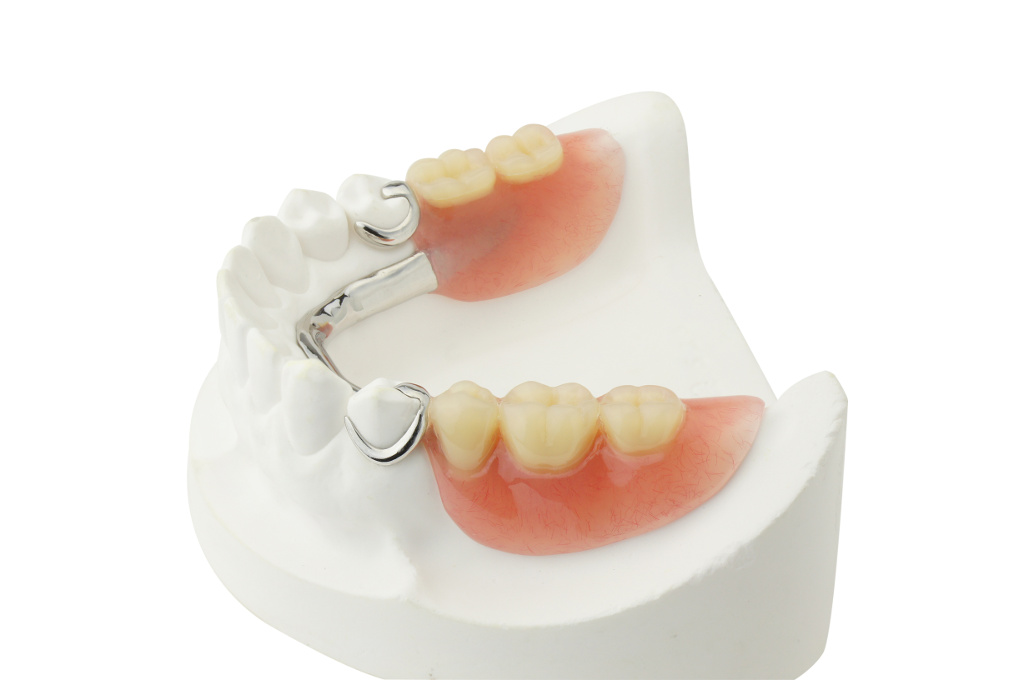Adapting to a new prosthesis
Adapting to a new prosthesis
You can’t get used to a new prosthesis in a day. It’s normal to go through an adaptation period of 1 to 2 weeks.
For the first few days, your dentures may cause you some discomfort:
- Excess saliva;
- Nausea: normally lasts from a few hours to a few days (consult a professional if nausea lasts longer than a week, as the prosthesis may require slight adjustment);
- The impression that the prosthesis is too large and pushes the lips forward;
- Pain: when teeth have been extracted, you may experience pain with your prosthesis until the gums have fully healed (6-8 weeks);
- Lower denture discomfort: the lower denture causes more discomfort than the upper denture, because the tongue’s constant movement contributes to the instability of the lower denture.
- Difficulty pronouncing certain words;
- Difficulty chewing certain foods.
Most side effects of removable prostheses resolve themselves within a few days. On the other hand, if the natural teeth are sensitive or the tissues are irritated, it’s important to return to the denturist for a slight adjustment of the prosthesis.
Feeding with a new prosthesis
During the period of adaptation to a new partial or complete denture, avoid eating hard foods. A soft, non-fibrous diet should be encouraged, gradually introducing more substantial foods.
Here are some examples of foods to prioritize during this period:
- The fish;
- Eggs;
- Minced meat;
- Cooked vegetables;
- Powders.

Tips for starting to chew with a prosthesis
The prosthesis will require an adaptation in the way food is chewed.
Here are a few guidelines to follow in the first few days:
- Avoid biting with the front teeth;
- Chew on both sides of the mouth at the same time to balance the pressure on the prosthesis and improve its stability;
- Take time to chew your food;
- Take small bites;
Note: you may lose your ability to perceive certain tastes. When you wear full dentures, especially for the upper arch, they cover part of your papillae. What’s more, they make it a little more difficult to perceive the temperature of food and liquids. Be careful not to burn yourself. Over time, you’ll adapt to these changes in sensation.

Foods to avoid
A partial or full denture is not as strong as natural teeth.
Certain foods should be avoided:
- Meat difficult to chew (steak);
- Corn on the cob;
- Crusty bread;
- Whole, hard fruit (e.g. apples);
- Sticky foods: chocolate, caramels, candies (may damage the prosthesis);
- Fruits containing small seeds (can slip between prosthesis and soft tissue);
- Nuts and seeds (they are hard and tend to be chewed only on one side of the mouth, which destabilizes the prosthesis);
- Excess diuretic drinks such as tea and coffee (cause dehydration and dry mouth);
- Popcorn.
Pronunciation tips
During the first few days with a new denture, it’s normal to have difficulty pronouncing certain letters (s,v,b and f) or words.
It’s a good idea to practice reading difficult words aloud, to get used to speaking with the new prosthesis in your mouth more quickly. This adaptation should only take a few days. At first, you may need to speak more slowly. The muscles in your lips, cheeks and tongue will get used to holding your dentures in place, and with a little practice, pronunciation problems will be overcome.
Prostheses that move
Denture adhesives can help keep dentures secure and stable. It can be used at the start of the transition and adjustment period, for example if gums are sore.
There are two main advantages to using an adhesive:
- prevent food particles from lodging between the prosthesis and the gum;
- reduce gum irritation and discomfort.
Here’s how to install it:
- clean and dry dentures;
- apply the adhesive drops to the denture (not too close to the denture edge);
- rinse mouth before fitting prosthesis;
- press and hold the prosthesis in place and bite for a few seconds to secure it.

When to change your prosthesis
A dental prosthesis should be changed every 5 years or so. The denturist will be able to tell you if your prosthesis needs to be renewed.
Delaying the replacement of your prosthesis can affect your appearance and comfort.
Here are some of the consequences that can result from a prosthesis that is too old:
- Damage to jaw joints;
- Irreversible changes to your physiognomy (sagging face, deepening mouth and premature aging);
- Mastication and digestion problems (depending on wear of denture teeth).
- Accelerated gum resorption;
- Sore, irritated gums;
- Headaches, earaches, neckaches.

Do not hesitate to consult
Contact your denturist if your prosthesis has the following characteristics:
- It adheres less well to the gums and moves around;
- It cuts food badly;
- It is yellowed;
- It causes discomfort or pain.
The longer you wait, the harder it is to adapt to a new prosthesis
Why wait for problems to arise? Adapting to a new prosthesis will be all the more difficult if you delay changing it.
In the U.S., people who wear full dentures keep them for an average of 17.6 years. This means that 20 million people wear dentures that are inadequate and ill-suited to the condition of their mouths. Why deprive yourself of the comfort of a well-fitting prosthesis? An annual appointment with the denturist and a change of denture every 5 years will undoubtedly prevent many problems.
